QuestionHeya
im 17 and have gad quite a few hamsters in the past, having one for up to 2 years and 8 months so i look after them well. Most of them still died of the same thing which i researched to be something called Wet Tail. They would have diohrea, loss of balance, weepy eyes and loss of appetite and eventually die. They were all very healthy up until they got this.
My younger sister is 15 and her second hamster (18 months old) is sadly dying of the exact same symptoms, we don't think she will last tonight as she can no longer move and is breathing only very slightly. We're just keeping her warm and stroking her now. My sister is quite distraught.
I just wanted to know if most hamsters die of this when theyre ready to go? If not then what causes it? i know it cant be prevented once it happens but it would be just nice to know if there's anything we can do to stop this happening again if we get another hamster.
Thanks for any help
Kerry.
AnswerHi Kerry
Sorry to hear about your sister's hamster.
A few questions/suggestions: Has this been diagnosed as wet tail? The term wet tail is often given by vets to hamsters with diarrhea/discharges, however, in reality it isn't actually the disease. Wet tail is a disease called proliferative ileitis and this can be brought on by stress (often in younger hamsters), temperature fluctuations and poor levels of hygiene which can lower the immune system. Some breeds such as the long haired varieties are believed to be more susceptible to this disease.
Treatment of this isn't very successful as hamsters lose fluids rapidly. Therefore at the first sign of diarrhea (of any kind) it is important to rehydrate the hamster. This can be done by giving human oral rehydration medicine - you buy sachets of the powder, mix according to the instructions, then using a dropper feed the hamster. Don't over-do it as rehydrating a hamster who isn't dehydrated can also cause problems. If you see a vet, they will rehydrate the hamster and probably give antibiotics.
Hamsters with wet tail need to be moved away from other cages of hamsters as they can pick it up from each other. Also, when handling an affected hamster it is vital you wash your hands before handling another hamster. Should a hamster die from wet tail, or you believe this to be the case, either throw their cage/toys etc. away, or disinfect thoroughly before re-homing another hamster in them. I leave cages soaking for a few weeks in a strong pet disinfectant before giving them a thorough rinse. I have only experienced wet tail once despite hundreds of hamsters coming through my doors during that time - her cage had been on the same shelf as another hamster and therefore the vet prescribed antibiotics for the other hamster, just in case he had come into contact with the disease. As it happened, he was fine.
Another condition hamsters can get which is similar to wet tail is Tyzzers Disease. The prognosis for this is poor, and apparently the spores from the causal organism can survive for up to a year in bedding/food/housing - hence the reason why it is vital you throw as much away as possible and thoroughly disinfect the cage after the death of a hamster you suspect might have had this.
There are bacteria can can cause diarrhea too, and some of these can be passed to humans, so you must be very careful with handling your hamster and if you have other hamsters you don't want to cross-infect.
It could be that your hamster doesn't have this as such, but she is suffering from diarrhea brought on by diet which has weakened her immune system. Diarrhea can be caused by giving milk (this is indigestible for a hamster - the only type of milk you should give a hamster if absolutely necessary is the special cat milk, or a powdered milk the vet has for orphaned animals, also lettuce (some of the 'dry' lettuce is OK in moderation, but the wetter varieties, such as Iceberg lettuce are too wet for them) can cause diarrhea. Excessive use of antibiotics to treat other conditions can also cause diarrhea.
Right now, it sounds as though you are doing all the right things - the main thing is to make sure your hamster isn't suffering. If you have a vet nearby it might be a good idea to take your hamster to them and ask them to put her to sleep, as you don't want her to be dying for a number of days - this is very upsetting to watch.
As you've had this happen a few times now, I would seriously consider the situation before getting another one. If you can, perhaps get a new cage, or as mentioned earlier, really disinfect the cage. Make sure any soiled areas of the cage are removed on a daily basis (you can train some hamsters to use a special hamster 'toilet' which means you can just rinse this out daily). Remove any uneaten fresh food daily so that it doesn't go mouldy. Fungal spores can collect on this and if they are breathed in by the hamster it can kill them - it causes a disease known as aspergillus and affects the hamster's breathing. Don't let your hamster have plastic houses etc. if the hamster sleeps in these they cause condensation which can make them ill as they are always sleeping in damp conditions. A wire cage, in a warm part of the house, away from direct sunlight or draughts is the best thing. This way air will circulate. It is worth keeping a packet of rehydration powders in the house just in case you ever notice your hamster to have diarrhea as you can start rehydrating them - however, ideally you should get a vet to check them out straight away.
If you would like to email me with your home address, I will happily forward one of my books to you which has more information about Wet Tail and other illnesses - which might act as a reference point in the future. You should email me at hamster.lady@virgin.net.
I'm sorry there is no happy ending in this case and I understand your sister's distress. There is nothing worse than watching your hamster die especially as you feel so helpless and keep wondering if there is something you could have done to prevent it.
All the best
Regards

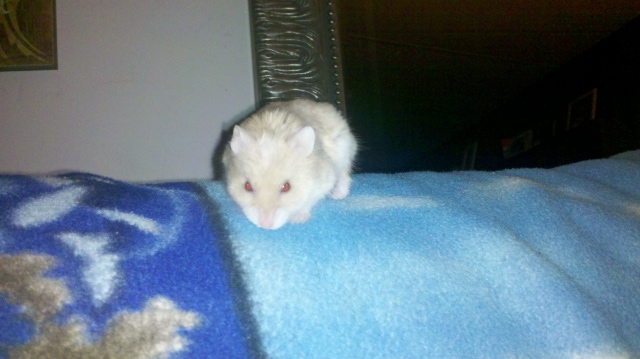 swollen face
Question
my hamster
I have a dwarf hamster not s
swollen face
Question
my hamster
I have a dwarf hamster not s
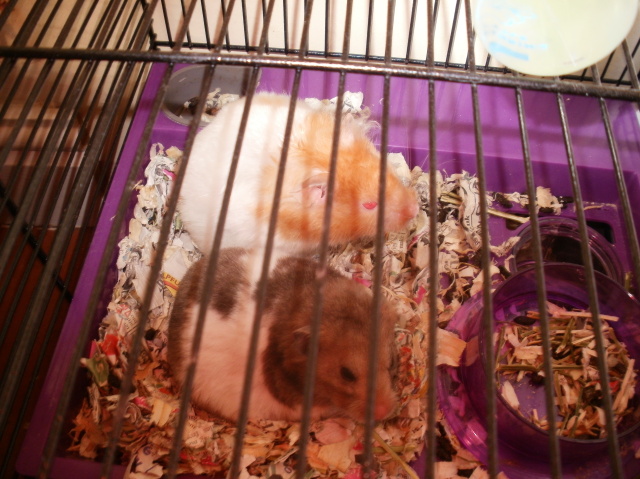 hamster cadge
Question
my hamsters
what should the normal hamster cad
hamster cadge
Question
my hamsters
what should the normal hamster cad
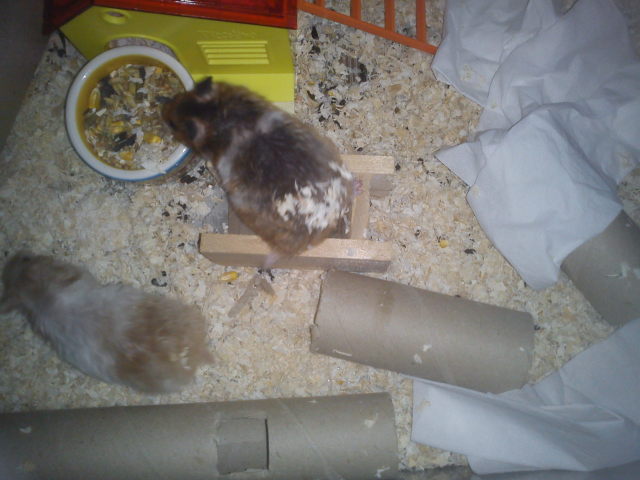 hamster fight
Question
hamsters
i already have 2 syrian hamsters (bot
hamster fight
Question
hamsters
i already have 2 syrian hamsters (bot
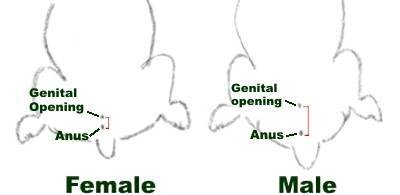 Babies!!! And more babies!!!
QuestionI bought 2 hamsters for my daughter and apparen
Babies!!! And more babies!!!
QuestionI bought 2 hamsters for my daughter and apparen
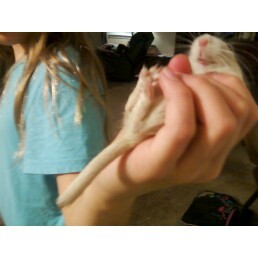 Help my gerbil!
QuestionMy gerbils tail
QUESTION: Hello,
Help my gerbil!
QuestionMy gerbils tail
QUESTION: Hello,